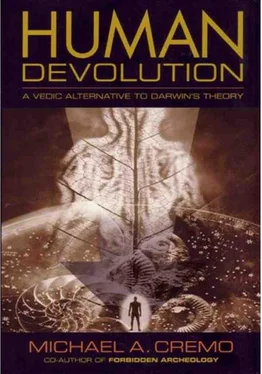Michael Cremo - Human Devolution - A Vedic Alternative To Darwin's Theory
Здесь есть возможность читать онлайн «Michael Cremo - Human Devolution - A Vedic Alternative To Darwin's Theory» весь текст электронной книги совершенно бесплатно (целиком полную версию без сокращений). В некоторых случаях можно слушать аудио, скачать через торрент в формате fb2 и присутствует краткое содержание. Год выпуска: 2003, ISBN: 2003, Издательство: Torchlight Publishing, Жанр: Старинная литература, на английском языке. Описание произведения, (предисловие) а так же отзывы посетителей доступны на портале библиотеки ЛибКат.
- Название:Human Devolution: A Vedic Alternative To Darwin's Theory
- Автор:
- Издательство:Torchlight Publishing
- Жанр:
- Год:2003
- ISBN:9780892133345
- Рейтинг книги:4 / 5. Голосов: 1
-
Избранное:Добавить в избранное
- Отзывы:
-
Ваша оценка:
- 80
- 1
- 2
- 3
- 4
- 5
Human Devolution: A Vedic Alternative To Darwin's Theory: краткое содержание, описание и аннотация
Предлагаем к чтению аннотацию, описание, краткое содержание или предисловие (зависит от того, что написал сам автор книги «Human Devolution: A Vedic Alternative To Darwin's Theory»). Если вы не нашли необходимую информацию о книге — напишите в комментариях, мы постараемся отыскать её.
Human Devolution: A Vedic Alternative To Darwin's Theory — читать онлайн бесплатно полную книгу (весь текст) целиком
Ниже представлен текст книги, разбитый по страницам. Система сохранения места последней прочитанной страницы, позволяет с удобством читать онлайн бесплатно книгу «Human Devolution: A Vedic Alternative To Darwin's Theory», без необходимости каждый раз заново искать на чём Вы остановились. Поставьте закладку, и сможете в любой момент перейти на страницу, на которой закончили чтение.
Интервал:
Закладка:
The potential explanatory power of this model, called by some the Gaudiya Vaishnava Vedanta (GVV) ontology, has been recognized by quantum physicist Henry P. Stapp, of the Lawrence Berkeley laboratory. Stapp observed (1994, p. 1), “The possibility that this ancient way of viewing Nature might be useful in science arises in the context of contemporary efforts to understand the empirically observed correlations between conscious processes and brain processes.” Such efforts are, according to Stapp, hampered by the concepts of mind and matter inherited by modern science from previous centuries. He finds the selfmind-body triad helpful in explicating the ideas of knower and known: “GVV accomodates these ideas in a straight-forward way by making a clear distinction between the subjective conscious knower, the spiritual
‘I’, and a mental realm that contains certain things that he can know directly. This mental realm, in contrast to the Cartesian realm of mind, is material: it is constructed out of a subtle kind of matter. The introduction of this second material level, mind, provides . . . a basis for coherently extending the mathematical methods of the physical science from the gross physical world into the realm of mind, while leaving intact the knower, or self” (Stapp 1994, p. 9). All in all, Stapp considered GVV ontology to be “internally consistent and compatible with the available scientific data” (Stapp 1994, p. 3). We can now begin our review of elements of spiritual cosmology in Western thought. There are many ways in which such a survey could be arranged. I have chosen to proceed as much as possible in time order.
The Presocratic philosopher Empedocles (c.495–c.453) spoke of gods, demigods, humans, and other species, each with their natural realm of existence. Empedocles said that if a soul inhabiting the body of a demigod, blessed with long life, commits a sinful act, then for many thousands of years that soul must take birth “in the forms of all manner of mortal things and changing one baleful path of life for another” (Kirk and Raven 1957, fragment 115). Empedocles described himself as “a fugitive from the gods and a wanderer” (Kirk and Raven 1957, frag. 115). He said, “Already have I once been a boy and a girl, a fish and a bird and a dumb sea fish” (Kirk and Raven 1957, frag. 117). He held that by philosophical insight and a pious life a soul can return to its original position.
Ideas of reincarnation were also found in Orphism, the Greek mystery cult that influenced some Presocratic philosophers and Plato. George Mylonas (1950, p. 178), an archeologist and art historian, said the Orphics believed humans were made from the ashes of the Titans, representing matter and its powers. But because the Titans had previously devoured Zagreus, a son of Zeus, whose essence was deathless, humans contained both divine and material elements, the divine being immortal and the material temporary. Mylonas (1950, p. 181) said, “Through purification and ritual, through sacred literature and initiation into the mysteries, through the Orphic life and asceticism, man could hope that the divine essence in him, his soul, by the intervention of divine grace would free itself of the original impurity, would escape the Great Circle of Necessity and the ever recurring weary cycle of rebirth, would attain redemption. . . . That was the supreme aim of life.”
According to his Greek and Roman biographers, Socrates communicated with a spirit being. “The familiar prophetic voice of my ‘spiritual guide’,” said Socrates, “has manifested itself very frequently all my life and has opposed me, even in trivial matters, whenever I was about to do something wrong” (Plato, apology of Socrates , 39C1–40C3; in Luck 1985, p. 187). The Greek word for the “spiritual guide” was daimonion . Xenophon, a disciple of Socrates, said Socrates referred to his daimonion as “the voice of God” (Xen. apology 12, in Luck 1985, p. 185). This is somewhat akin to the Vedic concept of paramatma , or Supersoul, which posits a localized personal expansion of God in the hearts of all living entities. Persons of a certain stage of spiritual advancement are able to directly communicate aurally with the Supersoul, and others may indirectly experience the promptings of the Supersoul in the form of intuitions and pangs of conscience. Of course, it may have been that Socrates was in communication not with Supersoul but with another kind of spirit being—for example, a minor demigod who had taken an interest in his activities.
In Plato’s Phaedo (81C–D, in Luck 1985, p. 169), Socrates speaks of ghosts. He proposes that ghosts are souls who were not “pure” when they left the body. They retain some subtle yet visible substance, which enables them to be sometimes seen. Good souls do not become ghosts. As punishment for impious deeds during their earthly existence, ghosts are compelled to wander near inauspicious places such as tombs and burial grounds until they are once more allowed to enter a normal physical body. Many elements of Socrates’s description of ghosts are familiar to me from Indian philosophy, which holds that the human organism is composed of three elements: a gross material body, a subtle material body composed of mind, and the soul itself, which is a particle of eternal consciousness. Under this view, ghosts are souls without gross material bodies. But they retain their subtle material forms (without, however, being allowed to enjoy subtle material pleasures) and in those forms haunt the living with a view to gaining control of a gross material body for gross material enjoyment. I propose that the action of the ghost’s subtle material body upon the subtle senses of an embodied person’s subtle body produces the perception of an apparition. After some time, the ghost is allowed to take on another physical form. If one properly uses this human form, one can become freed from both the subtle and gross material coverings, and attain to the realm of pure spiritual existence. A ghost is different from a demigod. The higher demigods and ghosts are both souls that have subtle material bodies. But demigods are pious souls who have been given positions in the universal system of management, and they are also given opportunities to experience subtle sensual pleasures surpassing those available to ordinary humans. Ghosts, on the other hand, are generally impious beings, whose subtle bodies are full of strong material desires that cannot be fulfilled. They are denied the subtle sensual pleasures available to the demigods.The only opportunities they have for satisfying their desires lie in commandeering the physical forms of humans, as in cases of possession.
In Book Ten of the Republic, Plato presents the story of the warrior Er, who died in battle (Eliade 1967, pp. 375–376). Twelve days after death, he revived, as he lay on his funeral pyre, and described what he had seen when his soul left his body. He and other souls came to a place where they saw two openings side by side in the heavens and two openings side by side in the earth. Through one of the openings in the earth souls were coming out and entering the opening leading into heaven. And through the second set of openings souls were coming down from heaven and entering the earth. The souls coming up through the opening in the earth described their sufferings in the hellish regions below, and those returning through the opening in the heavens described their enjoyment in the realm above. According to the Vedic cosmology, humans living on earth accumulate karma. Those with good karma, accumulated through pious acts, are elevated to the heavenly planets, but they return to earth when their good karma is exhausted. Those with bad karma, accumulated through impious acts, are sent to the hellish planets, but they return to earth when their bad karma is exhausted. If, however, one performs pure devotional service to God, one goes to the spiritual world, from which one does not have to return. Pure devotional service results in no karma, good or bad.
Читать дальшеИнтервал:
Закладка:
Похожие книги на «Human Devolution: A Vedic Alternative To Darwin's Theory»
Представляем Вашему вниманию похожие книги на «Human Devolution: A Vedic Alternative To Darwin's Theory» списком для выбора. Мы отобрали схожую по названию и смыслу литературу в надежде предоставить читателям больше вариантов отыскать новые, интересные, ещё непрочитанные произведения.
Обсуждение, отзывы о книге «Human Devolution: A Vedic Alternative To Darwin's Theory» и просто собственные мнения читателей. Оставьте ваши комментарии, напишите, что Вы думаете о произведении, его смысле или главных героях. Укажите что конкретно понравилось, а что нет, и почему Вы так считаете.












